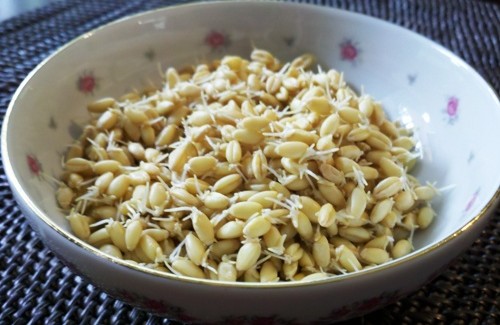
Sprouted Grains: The Next “It” Food?
09/28/2015
You may have been seeing signs or hearing rumblings of sprouted grains – on television, on food packaging, from friends or online. What’s the big deal, and what are sprouted grains, anyway? We asked Anne Cundiff, RD, LD, FAND, for some answers.
We’ve heard people talking about sprouted grains. Can you tell us what sprouted grains are? Are they the same as ancient grains?
Anne Cundiff:
Sprouted grains are whole grains or seeds that germinate and grow on their own by submerging and soaking in water and then placing in the right conditions to sprout. All the components of the grain or seed must be present: bran, germ and endosperm. Sprouted grains come from whole grains and ancient grains, so there isn’t a difference in the grain component, but there can be differences in nutrition, health benefits and tastes/textures.
What types of food are sprouted grains found in? Where are sprouted grains products located in the grocery store?
Anne Cundiff:
Sprouted grains are going to be in the form of a product made from the grains. The most common sprouted and easy-to-find foods are breads, tortillas and crackers. Most of these items are found in the specialty health sections of grocery stores.
Are sprouted grains the next big food trend?
Anne Cundiff:
I think sprouted grains have always been trendy, but they’re gaining momentum. I have had more and more requests and interest from consumers on sprouted grain products, not only for their health benefits but for the delicious flavors and textures sprouted grains bring to different products. Toasted sprouted bread with natural peanut butter is one of my favorites!
Are there any nutritional benefits to eating sprouted grains versus other types of grains?
Anne Cundiff:
There may be nutritional benefits to eating sprouted grains, but it really depends on the grain and what nutritional benefits it has originally. It really depends on the type of grain that is used for sprouting. A few different health benefits may include increased vitamin concentration, increased fiber content and increased absorption of certain minerals, such as iron, by the body.
Do people with gluten sensitivity or intolerance need to worry about consuming sprouted grains?
Anne Cundiff:
Yes, always. If a person has a gluten intolerance or sensitivity, they still need to choose sprouted gluten-free or wheat-free grains such as millet, quinoa and rice. There is a possibility that some methods of sprouting may reduce the gluten in the grain, but it is best practice to consume grains that are always gluten-free to be safe.
Do you eat sprouted grains? Tell us some of your favorites!
The image “Sprouted Wheat Berries” by Nourishing Cook is licensed under CC BY 2.0.


























